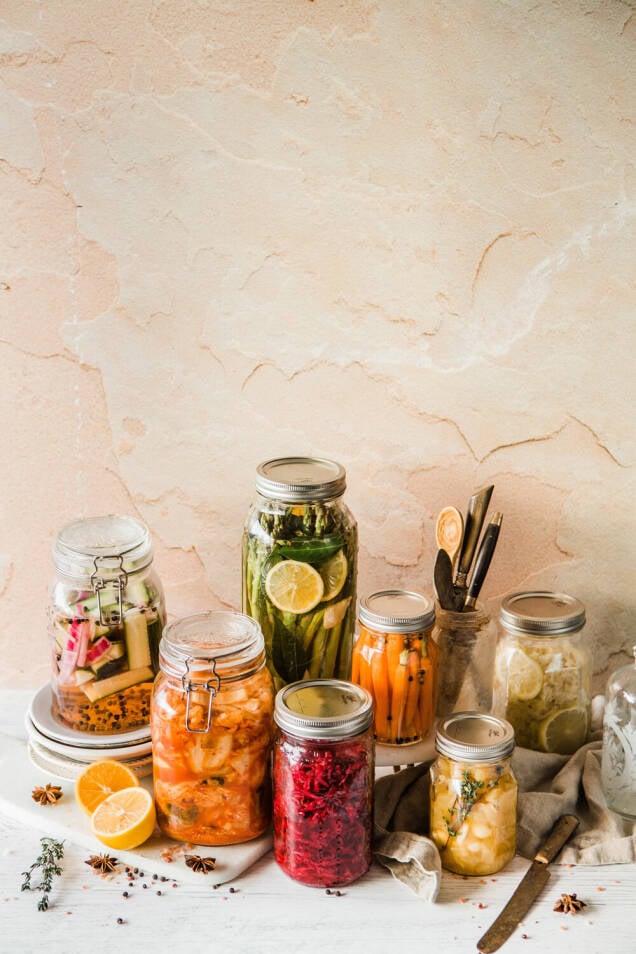Bacteria recruitment
Although the microbiome of the people who ate more fermented foods significantly changed - surprisingly - just 5 percent of the new microbes that were detected in their guts appeared to come directly from the fermented foods they ate. In a New York Times article, Justin Sonnenburg, an author of the new study and a professor of microbiology and immunology at Stanford said, there may be different explanations: “I think there were either low level microbes below the level of detection that bloomed, or the fermented foods did something that allowed for the rapid recruitment of other microbes into the gut environment.”
Research on how our microbiome and health is affected by fermented food is still in its infancy, but what is to be sure is that fermented foods have been used for centuries. Fermented food is ‘alive’ and keeps changing and taking different forms and the microorganisms they contain are constantly producing many nutrients during the process.
Inflammatory reduction
For the study, the researchers split 36 healthy adults into two groups. One group was assigned to increase their consumption of fiber-rich plant foods, while a second group was instructed to eat plenty of fermented foods. After the 10-week period, neither group had significant changes in measures of overall immune health. But the research results indicated that fermented foods may be valuable in countering the decreased microbiome diversity and increased inflammation pervasive in industrialized society. The fermented food group showed marked reductions in 19 inflammatory compounds, including interleukin-6, an inflammatory protein that tends to be elevated in diseases such as Type 2 diabetes and rheumatoid arthritis.
Sauerkraut superfood
Take sauerkraut for example; to make this, salt is added to white cabbage. This allows the lactic acid bacteria to survive soley. This bacterium converts sugars into lactic acid, an important substance for your gut. So eating fermented food may affect the trillions of bacteria, viruses and fungi that inhabit our gut. They may also lead to lower levels of body-wide inflammation, which scientists increasingly link to a range of diseases tied to aging.
There has even been scientific research on the way fermented food influences our health. A study that was published in the scientific journal Cell, had the aim to find out what impact fermented foods have on the gut and immune system, and how it compares to eating a relatively healthy diet full of fruits, vegetables, beans, whole grains and other fiber-rich foods


Probiotics in food
In fact fermentation is using a wide range of different methods to let certain products rot in a controlled way. Bacteria that are released through fermentation are also called probiotics. Probiotics are good for your gut. They survive the stomach acid and therefore reach the intestines. They can contribute to the balance of the microbiome. A healthy microbiome helps us to digest food, have a good immune system and even affects mental health. One of the things a healthy microbiome does is break down bad substances like sugars. Each type of fermented food has its own unique bacteria, each with different functions.
What is fermentation?
Fermentation doesn’t just benefit shelf life and taste. The ancient techniques also help to create products that are healthy. But before we get into that, let's define what fermentation is exactly. Simply put, one could say that fermentation happens when food is rotting. More complicated: Fermentation is a metabolic process that produces chemical changes in organic substrates through the action of enzymes.
More than just kombucha
Foods that could play an intriguing role in creating a healthy microbiome are fermented foods, and those entail more than just kimchi or kombucha. Many products that we consume daily, like coffee, cheese and bread, are fermented. For thousands of years people have relied on fermentation to preserve food and make sure that there was enough variety, during winter and times of scarcity. In fact you can ferment almost everything, from fruit and vegetables to even meat like salami.
Dr. Fang Fang Zhang, an associate professor of epidemiology at the Friedman School of Nutrition Science and Policy at Tufts University said in an article in the New York Times: “We should aim for adequate nutrition through diet rather than counting on supplements.”




Lisa Appels Xiao Er Kong
Food supplements seem to be one of the big lifestyle trends of the moment. Walk into a drugstore and you’re likely to find an entire aisle dedicated to probiotics. And although some may show some promise, others may just be part of a hype. Fact is we can find natural probiotics in all kinds of food; especially fermented food.


How fermented foods benefit our health
Sauerkraut superfood
expert opinion
4 min
Bacteria recruitment
Although the microbiome of the people who ate more fermented foods significantly changed - surprisingly - just 5 percent of the new microbes that were detected in their guts appeared to come directly from the fermented foods they ate. In a New York Times article, Justin Sonnenburg, an author of the new study and a professor of microbiology and immunology at Stanford said, there may be different explanations: “I think there were either low level microbes below the level of detection that bloomed, or the fermented foods did something that allowed for the rapid recruitment of other microbes into the gut environment.”
Research on how our microbiome and health is affected by fermented food is still in its infancy, but what is to be sure is that fermented foods have been used for centuries. Fermented food is ‘alive’ and keeps changing and taking different forms and the microorganisms they contain are constantly producing many nutrients during the process.

Inflammatory reduction
For the study, the researchers split 36 healthy adults into two groups. One group was assigned to increase their consumption of fiber-rich plant foods, while a second group was instructed to eat plenty of fermented foods. After the 10-week period, neither group had significant changes in measures of overall immune health. But the research results indicated that fermented foods may be valuable in countering the decreased microbiome diversity and increased inflammation pervasive in industrialized society. The fermented food group showed marked reductions in 19 inflammatory compounds, including interleukin-6, an inflammatory protein that tends to be elevated in diseases such as Type 2 diabetes and rheumatoid arthritis.
Sauerkraut superfood
Take sauerkraut for example; to make this, salt is added to white cabbage. This allows the lactic acid bacteria to survive soley. This bacterium converts sugars into lactic acid, an important substance for your gut. So eating fermented food may affect the trillions of bacteria, viruses and fungi that inhabit our gut. They may also lead to lower levels of body-wide inflammation, which scientists increasingly link to a range of diseases tied to aging.
There has even been scientific research on the way fermented food influences our health. A study that was published in the scientific journal Cell, had the aim to find out what impact fermented foods have on the gut and immune system, and how it compares to eating a relatively healthy diet full of fruits, vegetables, beans, whole grains and other fiber-rich foods

Probiotics in food
In fact fermentation is using a wide range of different methods to let certain products rot in a controlled way. Bacteria that are released through fermentation are also called probiotics. Probiotics are good for your gut. They survive the stomach acid and therefore reach the intestines. They can contribute to the balance of the microbiome. A healthy microbiome helps us to digest food, have a good immune system and even affects mental health. One of the things a healthy microbiome does is break down bad substances like sugars. Each type of fermented food has its own unique bacteria, each with different functions.
What is fermentation?
Fermentation doesn’t just benefit shelf life and taste. The ancient techniques also help to create products that are healthy. But before we get into that, let's define what fermentation is exactly. Simply put, one could say that fermentation happens when food is rotting. More complicated: Fermentation is a metabolic process that produces chemical changes in organic substrates through the action of enzymes.
More than just kombucha
Foods that could play an intriguing role in creating a healthy microbiome are fermented foods, and those entail more than just kimchi or kombucha. Many products that we consume daily, like coffee, cheese and bread, are fermented. For thousands of years people have relied on fermentation to preserve food and make sure that there was enough variety, during winter and times of scarcity. In fact you can ferment almost everything, from fruit and vegetables to even meat like salami.
Dr. Fang Fang Zhang, an associate professor of epidemiology at the Friedman School of Nutrition Science and Policy at Tufts University said in an article in the New York Times: “We should aim for adequate nutrition through diet rather than counting on supplements.”





Lisa Appels Xiao Er Kong
Food supplements seem to be one of the big lifestyle trends of the moment. Walk into a drugstore and you’re likely to find an entire aisle dedicated to probiotics. And although some may show some promise, others may just be part of a hype. Fact is we can find natural probiotics in all kinds of food; especially fermented food.



How fermented foods benefit our health
Sauerkraut superfood
4 min













